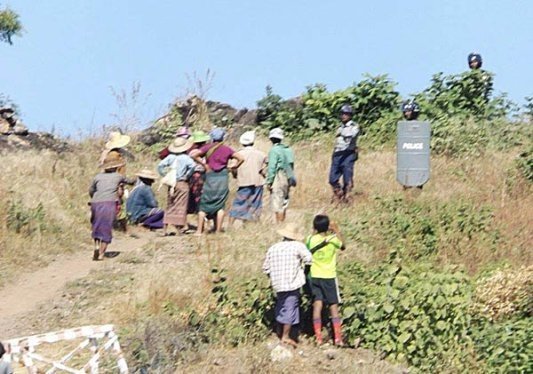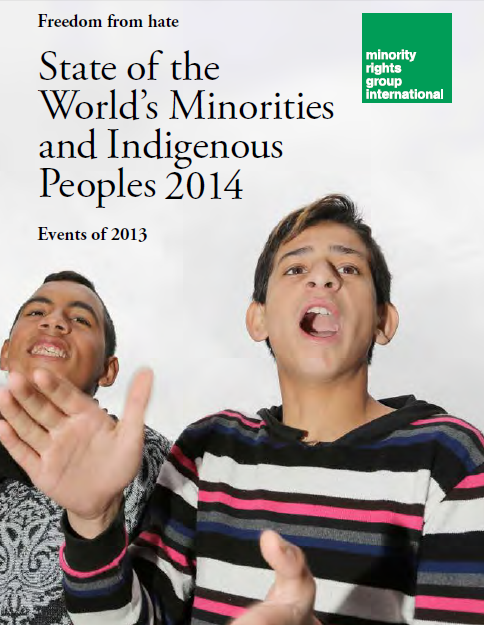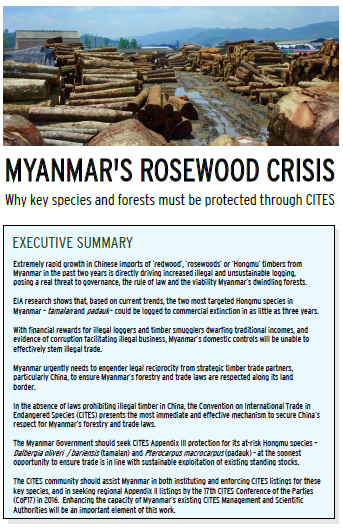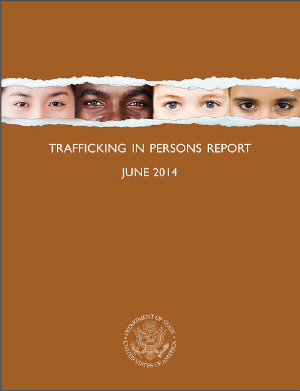Posts Tagged ‘China’ (70 found)
Two Injured as Latpadaung Protestors Clash with Police
 A confrontation between protestors and police left two villagers injured near the Latpadaung copper mine project in Sagaing Division on Saturday.
A confrontation between protestors and police left two villagers injured near the Latpadaung copper mine project in Sagaing Division on Saturday.
One villager was injured by rubber bullets while another was injured by a slingshot after protests broke out on Laikkhun Hill. Police were attempting to fence-off the land when they were confronted by locals who have refused compensation as part of government land seizures. […]
• •Southeast Asia Opium Survey 2014 – Lao PDR, Myanmar
The roots of the opium production problem in Southeast Asia go back to the 19th century. The region is home to the “Golden Triangle”, an area long associated with opium and heroin production, located where the borders of Myanmar, Lao People’s Democratic Republic (Lao PDR) and Thailand converge along the Mekong River. Twenty years ago, the Golden Triangle was the largest heroin‐producing area in the world, supplying the region’s own demand as well as exporting its surplus to North‐east Asia, Europe and the United States of America. In the 1990s and early 2000s, national and regional efforts succeeded in reducing both opium production and trade in the region, though they subsequently increased.
• • •Opium Production in the Golden Triangle Continues at High Levels, Threatening Regional Integration
Opium poppy cultivation in Myanmar and Lao PDR rose to 63,800 hectares (ha) in 2014 compared to 61,200 ha in 2013, increasing for the eighth consecutive year and nearly tripling the amount harvested in 2006, according to the Southeast Asia Opium Survey 2014 – Lao PDR, Myanmar. […]
• • •Burma: Judicial Harassment and Arbitrary Detention of Ms. Phyu Hnin Htwe
The Observatory for the Protection of Human Rights Defenders, a joint programme of the International Federation for Human Rights (FIDH) and the World Organisation Against Torture (OMCT), requests your urgent intervention in the following situation in Burma […]
• • •Arrest of Student on Trumped-up Charges is a Damning Indictment of Justice in Burma
 On 13 September 2014, police arrested female human rights defender (HRD) Phyu Hnin Htwe at her house in Patheingyi Township, Mandalay Region, and sent her to Monywa Prison, Sagaing Region, where she is currently being detained. Phyu Hnin Htwe is a second-year Burmese student at Mandalay’s Yadanabon University, and is also an activist and member of the All Burma Federation of Student Unions (ABFSU). She has helped farmers who have been forcibly evicted to make way for the infamous Chinese-backed Letpadaung copper mine in Sagaing Region, going to the Letpadaung area at weekends and supporting displaced farmers.
On 13 September 2014, police arrested female human rights defender (HRD) Phyu Hnin Htwe at her house in Patheingyi Township, Mandalay Region, and sent her to Monywa Prison, Sagaing Region, where she is currently being detained. Phyu Hnin Htwe is a second-year Burmese student at Mandalay’s Yadanabon University, and is also an activist and member of the All Burma Federation of Student Unions (ABFSU). She has helped farmers who have been forcibly evicted to make way for the infamous Chinese-backed Letpadaung copper mine in Sagaing Region, going to the Letpadaung area at weekends and supporting displaced farmers.
Her arrest ostensibly relates to a murky incident that took place on 18 May of this year. Two Chinese workers – employees of Wanbao company, the main company involved in the joint venture – were seized from the Letpadaung area, taken to a monastery in Hsete Village, and held there for about 30 hours. The incident followed efforts by Wanbao employees to restart measuring plots of land for which compensation had not even been provided, in spite of villagers’ protests, thereby provoking their anger.
As a result, Phyu Hnin Htwe and six villagers were charged with kidnapping and abduction under Articles 364 and 368 of the Penal Code, which prescribe sentences of up to ten years’ imprisonment. While the case against five of the villagers was quickly dropped, charges still remain against Phyu Hnin Htwe and local villager Win Kyaw, neither of whom attended court in May […]
• • •Myanmar Villagers Demand Release of Student Activist
 Hundreds of villagers in northern Myanmar, also known as Burma, have staged protests to demand the release of a student activist who was involved in the brief abduction of two workers at a Chinese copper mine this year.
Hundreds of villagers in northern Myanmar, also known as Burma, have staged protests to demand the release of a student activist who was involved in the brief abduction of two workers at a Chinese copper mine this year.
A monk in the Letpadaung area tells VOA that 500 to 600 locals staged peaceful protests in several villages Monday seeking the release of Phyu Hnin Htway, who was detained Saturday […]
• •Myanmar’s Rosewood Crisis
Extremely rapid growth in Chinese imports of ‘redwood’, ‘rosewoods’ or ‘Hongmu’ timbers from Myanmar in the past two years is directly driving increased illegal and unsustainable logging, posing a real threat to governance, the rule of law and the viability Myanmar’s dwindling forests.
EIA research shows that, based on current trends, the two most targeted Hongmu species in Myanmar – tamalan and padauk – could be logged to commercial extinction in as little as three years.
With financial rewards for illegal loggers and timber smugglers dwarfing traditional incomes, and evidence of corruption facilitating illegal business, Myanmar’s domestic controls will be unable to effectively stem illegal trade.
Myanmar urgently needs to engender legal reciprocity from strategic timber trade partners, particularly China, to ensure Myanmar’s forestry and trade laws are respected along its land border […]
• • •State of the Word’s Minorities and Indigenous Peoples 2014
 Hate crime towards minorities and indigenous peoples is a daily reality across Asia but is often ignored by the governments of the region, Minority Rights Group International (MRG) warns in its annual report. This year’s flagship report, State of the World’s Minorities and Indigenous Peoples 2014, is themed around ‘Freedom from Hate’ and shows that a worrying trend of vilification and hostility towards minorities and indigenous peoples has spread across the region.
Hate crime towards minorities and indigenous peoples is a daily reality across Asia but is often ignored by the governments of the region, Minority Rights Group International (MRG) warns in its annual report. This year’s flagship report, State of the World’s Minorities and Indigenous Peoples 2014, is themed around ‘Freedom from Hate’ and shows that a worrying trend of vilification and hostility towards minorities and indigenous peoples has spread across the region.
A key aspect of hate crime and hate speech is its invisibility, especially when governments or societies overlook or tolerate entrenched patterns of discrimination against particular communities, says MRG. Across Asia, governments have failed to provide adequate protection to its minority and indigenous populations.
“Hate crimes have been able to flourish in Asia largely as a result of the complicity or support of politicians who stand to gain from the persecution of minorities,” says Mark Lattimer, MRG’s Executive Director. “Hate speech goes unchallenged and crimes are often under-acknowledged and under-reported, enabling perpetrators to operate with impunity.” […]
• • •Trafficking in Persons Report 2014
Burma is a source country for men, women, and children subjected to forced labor, and for women and children subjected to sex trafficking in other countries. Burmese men, women, and children who migrate for work abroad, particularly to Thailand and China, are subjected to conditions of forced labor or sex trafficking in these countries. Poor economic conditions within Burma continue to drive large numbers of Burmese men, women, and children to migrate through both legal and illegal channels for work primarily in East Asia, as well as destinations including the Middle East, South Asia, and the United States. Men are most often subjected to forced labor, often in the fishing, manufacturing, and construction industries abroad. Women and girls are primarily subjected to sex trafficking or domestic servitude. The large numbers of migrants seeking work in Thailand’s fishing and domestic work sectors do so outside formal channels. Some Burmese men in the Thai fishing industry are subjected to debt bondage, passport confiscation, or false employment offers; some are also subjected to physical abuse and are forced to remain aboard vessels in international waters for years […]
• • •Northern Shan Farmers Call for Chinese Pipelines to be Removed from their Lands
Northern Shan farmers are submitting demands to Burma’s government today for China’s giant oil and gas pipelines to be removed from their lands immediately, citing rights abuses, poor construction and safety fears.
Representatives of the 10,000 strong Northern Shan Farmers’ Committee are today delivering their demands to the Shan State Parliament in Taunggyi, urging the removal of the trans-Burma pipelines before they become operational next month […]
• • •











 All posts
All posts